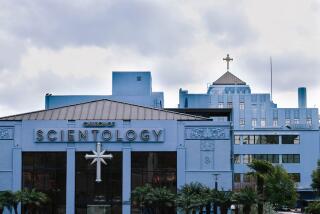$30-Million Award in Scientology Case Cut
- Share via
The state Court of Appeal has slashed a jury’s award of $30 million to a disaffected member of the Church of Scientology, who contended that the Hollywood-based organization drove him to the brink of insolvency and insanity.
In an opinion released this week, the appellate court reduced to $2.5 million the huge award, which was rendered in 1986 after a bitterly fought trial in Los Angeles Superior Court. The justices concluded that the assessment of $5 million in compensatory damages and $25 million in punitive damages against the Church of Scientology of California was “excessive,” “preposterous” and “grossly disproportionate” to the emotional injuries suffered by ex-Scientologist Larry Wollersheim.
“We completely annihilated the opposition on this,” exclaimed Heber Jentzsch, president of the Church of Scientology International. “As far as we’re concerned, it’s a total victory. . . . We’re the anvil that will break all hammers.”
The ruling was bittersweet for the controversial church. Although the appellate court drastically reduced the award, it rejected Scientology’s claims that the religion had been unconstitutionally placed on trial and that the verdict therefore should be overturned.
In an opinion laced with blistering language, Justice Earl Johnson Jr. wrote that “Scientology leaders made the deliberate decision to ruin Wollersheim economically and possibly psychologically.”
“Such conduct,” he said, “is too outrageous to be protected under the Constitution and too unworthy to be privileged under the law of torts.”
It was passages such as these that made the court ruling easier for Wollersheim to swallow.
“I feel wonderful,” he said Wednesday. “The key precedents we wanted, we won. These precedents will help contain Scientology’s barbaric practices.”
Wollersheim filed his lawsuit in 1980 after spending 11 years in Scientology, which was founded by the late science-fiction writer L. Ron Hubbard.
Dark Depressions
Wollersheim contended that Scientology’s courses and rites robbed him of his ability to think independently and plunged him into dark depressions, for which the church failed to seek professional help for him.
Wollersheim said, moreover, that after he broke with the group, he was subjected to Hubbard’s “fair game” law, which states that troublesome defectors “may be deprived of property or injured by any means by any Scientologist without any discipline of the Scientologist. May be tricked, sued or lied to or destroyed.”
Wollersheim alleged that Scientologists pushed his novelty store business into bankruptcy by quitting their jobs with him, boycotting his products and refusing to pay for merchandise they ordered.
After five tumultuous months of testimony in 1986, attended by such Scientology celebrities as John Travolta and Kirstie Alley, the 12 jurors unanimously sided with Wollersheim.
Judicial Interference
In affirming the verdict, if not the damages, the appellate court disagreed with the church’s claim that its religious practices are flatly protected by the Constitution from judicial interference.
The court said that in Wollersheim’s case, the practices were “conducted in a coercive environment.”
“Thus, none of them qualified as ‘voluntary religious practices’ entitled to the First Amendment religious freedom guarantees,” the court said.
More to Read
Sign up for Essential California
The most important California stories and recommendations in your inbox every morning.
You may occasionally receive promotional content from the Los Angeles Times.










